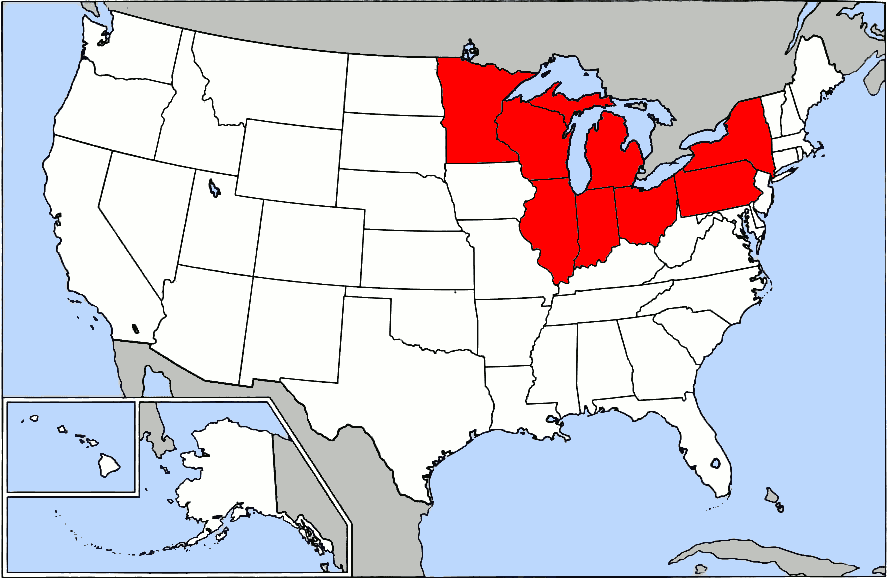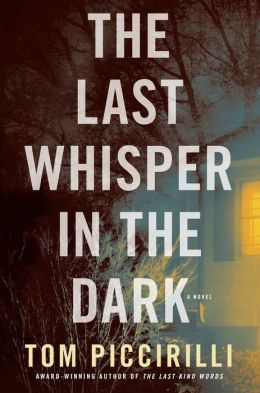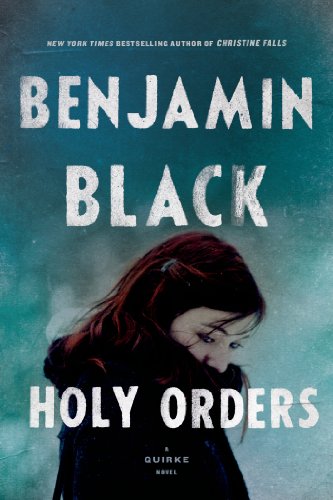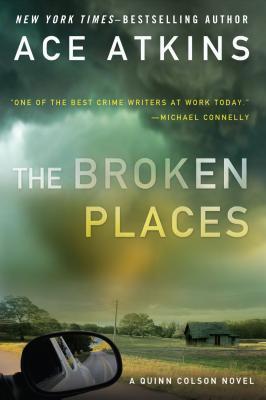 While kids contemplate going back to school––or have even returned already!––at Read Me Deadly, we're sifting through publishers' fall catalogs and prepublication reviews, trying to figure out what to read. Over the next two weeks, we'll be sharing our ideas about what looks good. Grab a pen and paper, because here we go.
While kids contemplate going back to school––or have even returned already!––at Read Me Deadly, we're sifting through publishers' fall catalogs and prepublication reviews, trying to figure out what to read. Over the next two weeks, we'll be sharing our ideas about what looks good. Grab a pen and paper, because here we go. Okay, end-of-the-world-as-we-know-it fans, you've read Peter Heller's poetic The Dog Stars, in which a Cessna pilot, Hig, and his dog, Jasper, navigate Colorado nine years after a super flu has eliminated most of humankind. You've visited the world 2,000 years after a nuclear war in Riddley Walker by Russell Hoban and witnessed the deaths of 99.4% of Earth's population and the resulting fight of good versus evil in Stephen King's The Stand. You've traveled through the crushing bleakness of the post-apocalypse in Cormac McCarthy's The Road and puzzled over the mysterious Area X of Jeff VanderMeer's Southern Reach trilogy (Annihilation; Authority; and Acceptance, to be released on September 2, 2014, by FSG Originals). Now, write this one down, because there's terrific buzz about Emily St. John Mandel's Station Eleven (Knopf, September 9, 2014).
Okay, end-of-the-world-as-we-know-it fans, you've read Peter Heller's poetic The Dog Stars, in which a Cessna pilot, Hig, and his dog, Jasper, navigate Colorado nine years after a super flu has eliminated most of humankind. You've visited the world 2,000 years after a nuclear war in Riddley Walker by Russell Hoban and witnessed the deaths of 99.4% of Earth's population and the resulting fight of good versus evil in Stephen King's The Stand. You've traveled through the crushing bleakness of the post-apocalypse in Cormac McCarthy's The Road and puzzled over the mysterious Area X of Jeff VanderMeer's Southern Reach trilogy (Annihilation; Authority; and Acceptance, to be released on September 2, 2014, by FSG Originals). Now, write this one down, because there's terrific buzz about Emily St. John Mandel's Station Eleven (Knopf, September 9, 2014).The novel begins with famous actor Arthur Leander's onstage heart attack during a performance of King Lear. Watching the doomed efforts of paparazzo Jeevan Chaudhary to save him is child actress Kirsten Raymonde. As Chaudhary later walks home, the Georgia Flu begins its swath of global destruction. The novel then weaves in and out, flashing back to the lives of Leander and his associates and examining the harsh existence of survivors years after his death. Kirsten is a member of a traveling troupe of Shakespearean actors on their way to an old airport housing the Museum of Civilization and a small settlement. Leander's gift to Kirsten, a graphic novel by his first wife titled Station Eleven, guides the troupe through the Great Lakes region, where a religious cult headed by the violent Prophet holds sway. In a decimated world, there are still plenty of ties that bind us.
For a while, it seemed there was no escaping books involving writers' quests. We had no sooner read about a year spent cooking a Julia Child dish daily before we were vicariously living a year spent Biblically. I enjoy quests at second-hand, but I prefer reading about a genuine obsession, such as a birder's attempt to see every bird species on earth, or one with personal meaning, such as an elderly man's effort to drive his lawn tractor 240 miles (top speed, about 6 miles/hour) across Iowa and Wisconsin to see his estranged, dying brother. These sorts of expeditions are of more psychological interest than one undertaken strictly for writing a book about it.
 In Martha Baillie's The Search for Heinrich Schlögel (Tin House, distributed by PGW, September 9, 2014), an unnamed narrator uses letters, journal entries, newspaper clippings, and maps to understand a surreal hike across Canada's remote Baffin Island by a 20-year-old German named Heinrich Schlögel. Inspired by his sister Inge's interest in the Inuktitut language and the diary of his hero, Samuel Hearne, a real-life 18th-century British explorer of the Canadian Arctic, Schlögel returns from what he thinks is a two-week trip to find that 30 years have elapsed, although he himself has not aged. After reading reviews that praise the beauty of Baillie's writing, and learning of her interest in the works of German writer W. G. Sebald (I loved Sebald's The Rings of Saturn, which involves a nameless narrator's walk through Norfolk, England, and the fascinating meditations about people and places the walk inspires), I quickly added this book to my list. It may not be for you if you dislike magical realism or best like linear stories with a definitive ending.
In Martha Baillie's The Search for Heinrich Schlögel (Tin House, distributed by PGW, September 9, 2014), an unnamed narrator uses letters, journal entries, newspaper clippings, and maps to understand a surreal hike across Canada's remote Baffin Island by a 20-year-old German named Heinrich Schlögel. Inspired by his sister Inge's interest in the Inuktitut language and the diary of his hero, Samuel Hearne, a real-life 18th-century British explorer of the Canadian Arctic, Schlögel returns from what he thinks is a two-week trip to find that 30 years have elapsed, although he himself has not aged. After reading reviews that praise the beauty of Baillie's writing, and learning of her interest in the works of German writer W. G. Sebald (I loved Sebald's The Rings of Saturn, which involves a nameless narrator's walk through Norfolk, England, and the fascinating meditations about people and places the walk inspires), I quickly added this book to my list. It may not be for you if you dislike magical realism or best like linear stories with a definitive ending.Maybe you remember the controversy over the ending of Irish writer Tana French's widely read 2007 book, In the Woods. Readers seemed to love or hate it. Like Patricia Cornwell's Postmortem, In the Woods won four crime-fiction awards for best first novel. It introduces the Dublin Murder Squad series, although it isn't necessary for enjoyment to read the books––a combination of psychological thriller and police procedural––in order. The fifth, The Secret Place, will be released by Penguin on September 2, 2014, and it is already receiving raves for French's meticulous plotting and stylish writing.
Its narrator is Dublin detective Stephen Moran, who works cold cases and dreams of joining the Murder Squad. His entrée comes when Holly Mackey, the teenage daughter of colleague Det. Frank Mackey, gives him a photo from a bulletin board for anonymous postings called "The Secret Place" at St. Kilda's School. In the photo is Chris Harper, a rich boy from a neighboring school, whose murder a year earlier remains unsolved. It's captioned "I know who killed him." French uses alternating chapters––and changes in timeline and point of view––to leap between the investigation of Murder Squad Detectives Moran and Antoinette Conway and four St. Kilda's girls in the school year up to Chris's murder and its aftermath.
All right, let's take a big hop from Ireland to Greece, where we find Jeffrey Siger's Andreas Kaldis. When we first meet Kaldis, in 2009's Murder in Mykonos, he is an Athens homicide detective. He is now the incorruptible (but realistic) head of Greece's Special Crimes Division. In 2012's Target: Tinos, Kaldis marries the wealthy and socially connected Lila Vardi, who is neither harebrained nor stuffy. Siger's characters age and their relationships change over time; it's enjoyable, but not necessary, to read these police procedurals in order of publication. This excellent series has a very strong sense of place: each book is set in a different part of Greece, and geography, history, culture, and current social issues are woven into the plot.
 In the sixth book, Sons of Sparta (Poisoned Pen, October 7, 2014), Special Crimes Division Det. Yiannis Kouros is called out to the Mani from Athens by an uncle who once ran one of the region's crime syndicates. A land sale that will make the family rich is in the works until the uncle's death in a suspicious car accident calls the sale off. If Kouros successfully wraps up his investigation of the accident, it could avoid a family vendetta; however, his superior, Kaldis, working on a political corruption case in Athens, takes a sniff and smells fish. I'm looking forward to spending time with Siger's characters and inhaling a lesson about modern and ancient Greece.
In the sixth book, Sons of Sparta (Poisoned Pen, October 7, 2014), Special Crimes Division Det. Yiannis Kouros is called out to the Mani from Athens by an uncle who once ran one of the region's crime syndicates. A land sale that will make the family rich is in the works until the uncle's death in a suspicious car accident calls the sale off. If Kouros successfully wraps up his investigation of the accident, it could avoid a family vendetta; however, his superior, Kaldis, working on a political corruption case in Athens, takes a sniff and smells fish. I'm looking forward to spending time with Siger's characters and inhaling a lesson about modern and ancient Greece.I love satirical honeymoons set in fictional paradise. Of course, they turn into nothing like heaven, and we see how the newly married respond when fate deals their romantic expectations a below-the-belt hit. Writer Carl Hiaasen sends one Florida honeymooner fishing in the Keys, where he hooks a severed human arm (Bad Monkey). Another, Manhattan ad executive Max Lamb, seeking to inject some excitement into his Disney World honeymoon, grabs a camcorder and his new wife and drives into the path of an oncoming hurricane; this is by no means the end of the Lambs' perilous day (Stormy Weather).
Lydia Millet, whose 2009 short-story collection, Love in Infant Monkeys, creates eccentric pairings between animals and celebrities, has also written an upcoming satirical thriller, Mermaids in Paradise (W. W. Norton, November 3, 2014). It features successful young Americans Chip and Deborah, who travel from Los Angeles to honeymoon at a resort in the British Virgin Islands at Chip's suggestion. From the get-go, Deb, the narrator, is skeptical of this destination; however, when a marine researcher takes some snorkelers to a coral reef, and they discover live mermaids, Deb is transformed. The group's efforts to keep their discovery secret fail, and the resort hurries to profit from it. But the group has some ideas about how to protect these mythical creatures, which I hope are fully half-baked––and completely entertaining.
 Few of us read crime fiction only because we're into the bludgeoning; stabbing; strangling; shooting; poisoning; electrocuting; rigging equipment (such as tampering with a car's brakes or wiring dynamite to the engine); pushing off a cliff, out a window, into an empty elevator shaft, in front of a vehicle or herd of stampeding elephants; crushing under a hydraulic press or in one of those diabolical rooms you've seen on TV where the maniac pushes a button and the walls close in on the victim, who already suffers from claustrophobia; drowning in the tub––if the murderer can figure out how to close the drain (I've been in hotel tubs in which I've had to ask my husband); feeding into a tree chipper or dismembering with a chainsaw or something not gas-powered, like a hacksaw or Swiss Army knife (I dream of receiving this one as a gift); leaving out in the elements to die of exposure, be eaten by wolves, or be beamed up to a passing flying saucer, experimented upon, and tidily vaporized by overly curious outer-space aliens, conscientious to a fault about not leaving evidence of their existence behind.... To cut to the chase, I read crime fiction because I like puzzles and the exploration of human nature and society in the framework afforded by the commission, investigation, and solution of a crime.
Few of us read crime fiction only because we're into the bludgeoning; stabbing; strangling; shooting; poisoning; electrocuting; rigging equipment (such as tampering with a car's brakes or wiring dynamite to the engine); pushing off a cliff, out a window, into an empty elevator shaft, in front of a vehicle or herd of stampeding elephants; crushing under a hydraulic press or in one of those diabolical rooms you've seen on TV where the maniac pushes a button and the walls close in on the victim, who already suffers from claustrophobia; drowning in the tub––if the murderer can figure out how to close the drain (I've been in hotel tubs in which I've had to ask my husband); feeding into a tree chipper or dismembering with a chainsaw or something not gas-powered, like a hacksaw or Swiss Army knife (I dream of receiving this one as a gift); leaving out in the elements to die of exposure, be eaten by wolves, or be beamed up to a passing flying saucer, experimented upon, and tidily vaporized by overly curious outer-space aliens, conscientious to a fault about not leaving evidence of their existence behind.... To cut to the chase, I read crime fiction because I like puzzles and the exploration of human nature and society in the framework afforded by the commission, investigation, and solution of a crime. That said, I don't read much modern crime fiction that would qualify for the Mary Higgins Clark Award (see here). Sometimes, though, it's a pleasure to pick up a book and find little graphic violence and a smart, likable, and independent female protagonist. If there's a well-done romance, it's all gravy.
That said, I don't read much modern crime fiction that would qualify for the Mary Higgins Clark Award (see here). Sometimes, though, it's a pleasure to pick up a book and find little graphic violence and a smart, likable, and independent female protagonist. If there's a well-done romance, it's all gravy.Hank Phillippi Ryan's Jane Ryland series begins with the Mary Higgins Clark Award-winning The Other Woman. Jane is a former TV investigative reporter, now employed by the Boston Register. In the upcoming third book, Truth Be Told (Forge, October 7, 2014), Jane is working on stories about foreclosures and banking financial services, when a murdered body drops onto her plate. Her investigation expands and becomes more dangerous. Readers will be pleased, because hunky Det. Jake Brogan of the Boston PD is handling a cold-case investigation that may tie in with Jane's stories, and he has eyes in his head to see Jane is no slacker in the beauty and brains departments. Author Ryan, a TV investigative reporter who has won more Emmys and journalism awards than you would believe, is a skillful writer, and she combines an examination of social issues and a sure touch with Jane and Jake's will-they-or-won't-they relationship. That sort of smoldering helped make early years of the TV series Moonlighting, with Cybill Shepherd and Bruce Willis, very popular. How often do you find that special longing sweetness in your crime fiction?
I've been a Denis Johnson fan for a long time. If you're interested in influential American novelists whose subject is America, you may have read Jesus' Son, a collection of hallucinatory short stories revolving around some rural addicts; Tree of Smoke, an epic featuring Skip Sands, a CIA officer in the 1960s mess of Vietnam; or Train Dreams, a 116-page gem about Robert Grainier, a working man in the changing early-1900s American West.
On November 4th, Johnson's literary thriller, The Laughing Monsters (Farrar, Straus & Giroux), will appear. Kirkus Reviews terms it a "taut, Conrad-by-way-of-Chandler tale about a spy who gets too close to the man he’s shadowing in Africa." The spy is NATO agent Roland Nair, a Scandinavian with a US passport, who returns to Africa to meet his old friend Michael Adriko and Michael's fiancée, Davidia, a college girl from Colorado, in Sierra Leone. Roland and Michael, who has worked as a soldier of fortune and as Roland's colleague in anti-terrorism, made a lot of money during Sierra Leone's civil war. Davidia, Michael, and Roland set off to visit Michael's family on the Congo-Uganda border, but all three may have a hidden agenda. They soon attract the interest of various espionage and law enforcement agencies, and their personal and professional loyalties undergo testing. A re-read of Joseph Conrad's Heart of Darkness may be in order, and then I'm going to sit down with this one.
I enjoy Japanese writer Keigo Higashino's Detective Galileo books, which feature Manabu Yukawa, a brilliant physics professor with a knack for solving crime, and Tokyo police detective Kusanagi. The Devotion of Suspect X and Salvation of a Saint aren't so much whodunits as howdunits or whydunits or willtheygetawaywithits. The detective-suspect games of cat-and-mouse contain surprising twists, and the books explore the nature of guilt, anguish, loyalty, and human relationships.
When Malice (translated from the Japanese by Alexander O. Smith, with Elye Alexander) is published by Minotaur Books on November 7th, we'll get a look at another Higashino series. This one features Kyochiro Kaga, a police detective in the Tokyo Metropolitan Police Department's First Investigative Division. It's the first English translation, and it sounds like fun. It seems that best-selling Japanese novelist Kunihiko Hidaka has been strangled in a locked room of his locked house. The two people who find him are his wife and his best friend, Osamu Nonoguchi; they both appear to have solid alibis. When Kaga investigates, he discovers Nonoguchi is an old colleague from his days of teaching school, and his investigation gains a personal element.
I used to hang out with a bunch of physicists, and at some point during dinner, we non-physicists inevitably started peppering the physicists with questions. What happens if I bore a straight tunnel all the way through the earth, and then drop a ball down the hole? Do I stay drier in the rain if I walk or run to the front door from my car? They'd debate the answers and scribble on paper napkins for illustrations. Of course, as the night went on, our questions would become more preposterous––and their answers more entertaining.
If you love science and like to consider hypotheticals, you'll be interested in Randall Munroe's 320-page What If?: Serious Scientific Answers to Absurd Hypothetical Questions (Houghton Mifflin Harcourt, September 2, 2014). Munroe studied physics and then built robots at NASA before leaving to to draw comics on the internet full time. His xkcd.com is called "A webcomic of romance, sarcasm, math, and language," and it's an enjoyable and informative place to visit. You can see some questions and answers by clicking on "What If?". (Anyone who has ever struggled to answer a child's tough question about how the world works will be amused by questions that begin, "My six-year-old asked me....") Some question examples are as follows: "What if everyone only had one soulmate? How dangerous is it, really, in a pool in a thunderstorm? If we hooked turbines to people exercising in gyms, how much power could we produce? What if I took a swim in a spent-nuclear-fuel pool?" Munroe's answers are witty, well researched, and illustrated with cunningly drawn little stick figures, cartoons, diagrams, mathematical equations, etc. The book contains both new questions/answers and some of the most popular questions/answers from the xkcd website. I definitely need to read this one.
That's it for today. I'll be back in a few days with more upcoming books. Tomorrow, Sister Mary will tell you about some great-looking fall books set during World War II and the Cold War.
























